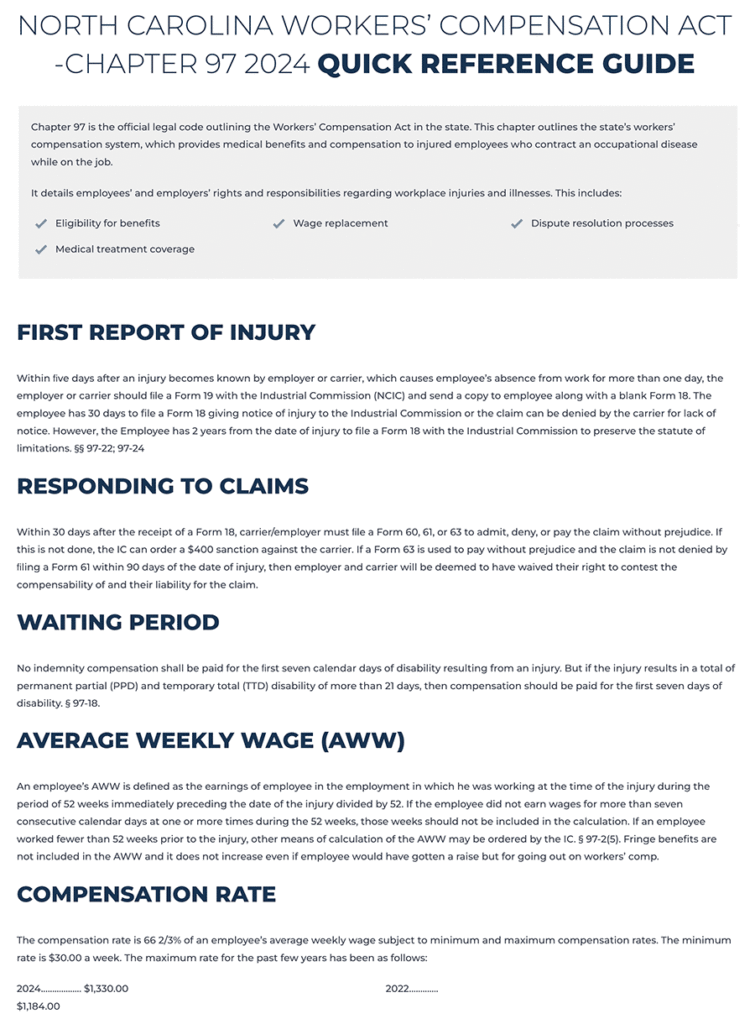Injured on the job in North Carolina?
We understand the confusion and frustration that often results when you get hurt on the job. While coping with pain and working towards your physical recovery, there are also important phone calls to be made, forms to be filled out, communication that must take place between your employer, insurance companies, doctors’ offices, nurse case managers… the list goes on and on.
Workers’ compensation is a no-fault insurance system designed to protect workers who are injured or become ill due to their job by providing financial benefits to cover their medical bills, lost wages and other expenses. Unfortunately, this system can be needlessly complex and it’s often difficult to figure out which benefits are available to you and how to go about getting them. But understanding your rights is half the battle — and the Wilder Pantazis Law Group can help you obtain the benefits you deserve.
Many of our work injury attorneys are nationally recognized North Carolina State Bar Board Certified Workers’ Compensation Specialists. Our team has received numerous honors and awards, and we are regularly invited to speak as authorities in North Carolina law. We are ready to use this knowledge and experience to help you recover the financial help you so desperately need during this difficult time.
Se habla español
Nuestro bufete se especializa en la ley de compensación laboral de Carolina del Norte y Carolina del Sur. Tenemos muchos años de experiencia apoyando a los trabajadores que han sufrido por una lesión de trabajo.
Why hire our law firm?

As a boutique injured workers law firm that exclusively handles certain legal practice areas, we can best predict how local laws affect your case. By devoting our time, attention and resources to win your case, we are able to provide you with the highest level of coordination of benefits that you may not receive at other law firms.
Here are a few other reasons why injured workers across the Carolinas choose the Wilder Pantazis Law Group attorneys to represent them:
- We offer free consultations.
- We work on a contingency fee basis (meaning you don’t pay unless we win).
- We’re passionate about helping our clients.
- We’re always available to answer your questions.
- We treat each client like family.
- We’re friendly, honest and truthful.
- We communicate regularly and effectively.
- Our office is warm and inviting.
Learn about the water contamination at Camp Lejeune, and find out how to get compensation if you or a family member was affected.
Timeline for reporting a work injury in North Carolina
- Seek medical attention immediately for emergencies.
- If not an emergency, see a doctor (approved or your own) and explain the work-related injury.
Caution: While you can see your own doctor, treatment may not be covered by workers’ compensation unless pre-approved by your employer or workers’ compensation carrier.
- Verbally notify your employer about the injury (recommended).
- Within 30 days, provide written notice to your supervisor or HR, including:
- Date and time of the accident
- Brief description of what happened
- List of injured body parts
- Keep a copy of the written notice for your records.
- File a claim (Form 18) with the North Carolina Industrial Commission (NCIC).
- You can contact a friend, attorney, or NCIC (1-800-688-8349) for help filling out the form.
- Send 2 copies to NCIC, 1 copy to your employer, and keep 1 copy for yourself.
Tip: Filing sooner, following doctor’s orders and keeping copies of all your documents helps strengthen your case and ensures eligibility for benefits.
- The insurance company should provide written notice of whether they accept or deny your claim.
Taking action: A step-by-step guide to filing workers’ comp claims
Here’s a breakdown of the key actions to take:
Step #1:
Seek medical attention
Your top priority should always be your personal health and well-being. Upon verbally telling your boss or employer about your injury or accident, they should give you instructions on seeing an approved doctor.
You may also see your own doctor for a second opinion but know that this visit may not be covered by workers’ compensation.
If your workplace has a healthcare provider on-site, see that individual. If the injury is an emergency, immediately go to the nearest hospital or emergency care facility and worry about telling your employer later.
While at the doctor’s office, explain your work-related injury or illness to the physician. Explain how it happened or when you first noticed the symptoms. Ensure the doctor has your employer’s name and knows you will file a workers’ compensation claim.
It’s important to follow all of the doctor’s orders regarding treatment for your injury or illness and attend any follow-up appointments that may be recommended.
Failing to obey medical instructions or attend follow-up appointments can jeopardize your workers’ compensation claim and give the insurance company a reason to deny your benefits.
Step #2:
Notify your employer
Even though you or a coworker likely already verbally told your employer about your injury prior to seeking medical treatment, it’s important that you follow up with a written notice to your immediate supervisor or to the human resources (HR) department.
North Carolina law says that you have 30 days from the date of your accident to report any injury to your employer in writing.
The sooner you can provide a written notice, the better — as any delays will look suspicious to the insurance company.
Your written notice should include:
- the day and time of the accident
- a brief description of what happened
- a list of what parts of your body were hurt.
It doesn’t have to be a formal letter. Writing a short note will satisfy the notice requirement.
Keep a copy of your written notice because it will help you prove your case.
If your injury prevents you from giving written notice, ask a friend or a coworker to tell your employer what happened and that you will give written notice as soon as you are able to do so.
It’s a good idea to tell your coworkers what happened in case your supervisor later tries to deny receiving notice of your claim.
Step #3:
File a claim
Form 18 — Notice of Accident to Employer and Claim of Employee, Representative or Dependent for NC Workers’ Compensation Benefits — is the document that must be filed with the North Carolina Industrial Commission (NCIC) within 2 years from the date of your injury.
While we encourage injured workers to submit this form within 30 days, you technically have 2 years to do so before your claim will be disqualified from receiving workers’ compensation benefits.
The longer you wait to submit this form, the greater the risk that the insurance company will dispute or deny your claim.
You can contact a friend, an attorney or the North Carolina Industrial Commission for help filling out this form. The phone number for the NCIC is (800) 688-8349.
You will need to send 2 copies of Form 18 to the Industrial Commission, 1 copy to your employer and keep 1 copy for yourself.
The insurance company should make a decision and provide written notice of whether it is accepting or denying your claim within 14 days of receiving your Form 18.
In some cases, the insurer will file a conditional acceptance if it needs more time to investigate the claim. If the insurance company accepts your claim and your costs are fully covered, you should receive Form 60 — Employer’s Admission of Employee’s Right to Compensation — or Form 63 — Notice To Employee of Payment without Prejudice.

Chapter 97 is the official legal code outlining the Workers’ Compensation Act in the state. It details employees’ and employers’ rights and responsibilities regarding workplace injuries and illnesses. This includes:
- Eligibility for benefits
- Medical treatment coverage
- Wage replacement
- Dispute resolution processes
“Help! My claim was denied…”
If the insurance company denies your claim, know that you may still have rights under the law to appeal the denial. You will receive a copy of Form 61 — Denial of NC Workers’ Compensation Claims — from your employer or their insurance company. This document should explain the reasons for the denial. In this scenario, it’s wise to hire an attorney to determine if there are grounds for filing an appeal of the denial.
If the case has merit, your attorney will file a request for hearing with the Industrial Commission by submitting Form 33 — Request for Hearing with the North Carolina Industrial Commission. Before the hearing, your attorney will gather evidence and respond to questions from the insurance company’s lawyer.
It’s important to understand that a workers’ compensation hearing is not the same thing as filing a formal lawsuit against your company and its workers’ compensation carrier. During the hearing, your attorney will present your case in front of an administrative law judge with the Industrial Commission, arguing that your workers’ compensation benefits should be granted and the denial be reversed.
Document how your life has changed since your accident
The trauma of an accident can make remembering all of the details of the crash difficult. Keep a post-accident journal to help document your case.
When to consult a work injury lawyer
Meeting with an experienced and qualified workers’ comp attorney is always recommended when you’ve been hurt at work. If any of the following statements are true, we strongly advise that you reach out to one of our knowledgeable attorneys for legal advice:
- Your workers’ compensation claim is denied or disputed
- Your benefits are delayed or reduced for no reason
- The settlement offered doesn’t cover all of your past and future medical bills, lost wages and other expenses
- Your injury is so severe that it limits or prevents you from returning to work
- You plan to apply for Social Security disability benefits (or are currently receiving them)
- You have a pre-existing condition
- Your employer retaliates against you for filing a workers’ compensation claim
- You need to negotiate with an insurance company
- You were injured by a third party or your employer’s gross misconduct (i.e. unsafe working conditions)
- You have an upcoming workers’ compensation hearing
Meet our attorneys
Established in 2018 to serve injured workers in North and South Carolina, the Wilder Pantazis Law Group is powered by a team of tried and tested attorneys with decades of experience successfully handling cases across the region. We are dedicated to providing the highest quality of legal services in the areas of workers’ compensation, personal injury, and complex civil litigation.
Client reviews and testimonials
The people working at Wilder Pantazis Law Firm are delightful to work with. They are all friendly, courteous, knowledgeable and very professional. They all make you feel at home in their office and that you are the most important client they have. I would definitely recommend this law firm for your legal needs. They are worth every penny. - Jackie R.
“Beau Wilder was great to work with on my Workers’ Compensation case. He was always available to answer questions and made the process seamless. He went above and beyond in the whole process! Highly recommend letting him help you.”
- Brandon Watts
“Beau Wilder was amazing to work with regarding my workers’ compensation case. Mr. Wilder treated me like family and fought hard for my rights and compensation. I recommend Mr. Wilder for anyone looking for a professional, hardworking and genuine attorney!”
- Daniel Hardin
“Ms. Pantazis breaks the mold of the normal attorney. You don’t feel like you need a shower after talking to her. She is friendly, honest and truly cares about her clients. Things didn’t go as well as I wanted but would’ve been worse with anyone other than Annemarie.”
- William Gross
North Carolina
workers’ compensation resources
How the workers’ compensation process works in North Carolina
- What is COBRA, and Are You Eligible for Continuation Coverage?
- Injured Worker’s Guide to Drug Formularies in Workers’ Compensation
- Off-Premises Work Injuries & Workers’ Compensation
- What Does “Course and Scope of Employment” Mean?
- What Workers’ Compensation Benefits Are Available in North Carolina?
- Workers’ Compensation for State & Local Government Employees
- Returning to Work After an Occupational Injury or Illness in North Carolina
- Guide to Disability Benefits in North Carolina
- A Guide to Workers’ Comp Medical Benefits in North Carolina
- North Carolina Workers’ Comp Benefits for Wage Loss
- North Carolina Vocational Rehabilitation Benefits
- A Guide to Drug Tests & North Carolina Workers’ Compensation
- How To Avoid Common Workers’ Comp Insurance Adjuster Tricks
- How To Spot a Bad Workers’ Compensation Lawyer
- North Carolina Workers’ Comp & Light Duty Restrictions
- Can You Be Fired After a Work-Related Injury in North Carolina?
- What Is a Waiver of Subrogation in Workers’ Compensation?
- NC Workers’ Comp for Tornadoes, Hurricanes & Natural Disasters
- Reopening a North Carolina Workers’ Comp Claim: A Guide for Injured Workers
- Who Is Exempt From Workers’ Comp in North Carolina?
- Taking a Vacation While on NC Workers’ Comp: What You Need To Know
- North Carolina Workers’ Compensation Deadlines and Statute of Limitations
- What To Expect After Hiring a Workers’ Compensation Lawyer
- Understand Your Workers’ Compensation Rights in North Carolina
- North Carolina Workers’ Compensation Laws for Subcontractors & Independent Contractors
- North Carolina Workers’ Comp Death Benefits: A Guide for Families
- New NC Medicaid Expansion Extends Coverage to 600,000 More Residents
- A Guide to North Carolina Temporary Total Disability (TTD) Benefits
- A Guide to Temporary Partial Disability (TPD) Benefits in NC
- A Guide to Permanent Partial Disability (PPD) Benefits in NC
- A Guide to Permanent Total Disability (PTD) Benefits in NC
- Top Reasons for Denied Workers’ Comp Claims & How To Appeal
- Employer Retaliation After Getting Hurt at Work
- How To Appeal a Denied Workers’ Comp Claim in NC
- When Will Workers’ Comp Offer a Settlement?
- Conozca Sus Derechos Bajo Las Leyes de Carolina del Norte y La Compensación Laboral
Workers’ compensation FAQ:
common questions and answers
What are workman’s comp benefits?
The types and amount of compensation you are entitled to after a workplace injury or illness vary by state. In North Carolina, injured workers can be granted 4 types of workers’ compensation benefits:
- Medical benefits. You should be reimbursed for any past and current medical bills pertaining to your work-related injury or illness (such as emergency room visits, surgeries, hospital bills, prescriptions, therapy, etc.), as well as compensation for future treatment and care that may be required. Your benefits should also cover any travel expenses going to and from treatment.
- Lost wages and disability. If you had to take more than 7 days off work to recover from your occupational injury or illness, then you should be owed benefits adding up to two-thirds of your average weekly wage prior to the injury (up to the state’s maximum weekly rate, which is updated each year). Your income benefits will fall into 1 of 4 categories: temporary partial disability (TPD), temporary total disability (TTD), permanent partial disability (PPD) or total permanent disability (TPD). You don’t qualify for lost income benefits if you missed less than 7 days of work.
- Vocational rehabilitation. If your injury or illness is so debilitating that you can’t return to your old job or are earning less income as a result, you may be eligible for vocational rehabilitation services that include “vocational assessment, vocational exploration, sheltered workshop or community-supported employment training, counseling, job analysis, job modification, job development and placement, labor market survey, vocational or psychometric testing, analysis of transferable skills, work adjustment counseling, job-seeking skills training, on‑the‑job training, or training or education through the North Carolina community college or university systems.” (§97-32.2)
- Death benefits. If a person dies as a result of a fatal workplace accident or job-related illness, then their surviving spouse, children and other family members may have access to wrongful death benefits that include two-thirds of the deceased’s pre-injury average weekly wage for 500 weeks, in addition to funeral and burial expenses totaling up to $10,000.
Why is North Carolina’s “accident” rule a potential problem for injured workers?
Most people who get hurt at work assume that it will be covered by workers’ compensation. However, no matter how much you trust and like your employer, ultimately the insurance adjusters that actually administer the claims will always look for ways to deny coverage. These adjusters will often set up recorded statements and ask questions in a way to make it seem as if there was no “accident.”
In North Carolina workers’ compensation law, an “accident” is an interruption of the normal work routine by an unexpected and untoward event. Therefore, an injury while doing normal work in a normal manner does not qualify as an accident. An accident is a deviation from the normal work routine, such as a fall, some assaults, increased volume or pace of work and literally hundreds of other events.
For example, let’s say a Charlotte airport baggage claim handler injures their shoulder while loading a bag into an airplane. Under these circumstances, the adjuster might ask: “You weren’t doing anything wrong or different than normal, were you? You were just doing your job the normal way that you have always done it, weren’t you?” Most people would answer, “No, I wasn’t doing anything different. Yes, I was doing my normal job in the way I was trained to.”
The injured airline employee wouldn’t think to mention the many things that could be unusual about why he or she was injured, such as the bag being too heavy and awkward, the bag falling backward, not having the correct number of people to help with the baggage or something in the bag that shuffled and caused it to slip. Any of these small factors could be considered an accident that caused the injury, but the claim could be denied or reduced simply because the injured worker failed to mention them in a recorded statement.
There are also exceptions to the general “accident” rule. For example, if a worker has an immediate onset of pain in their spine while performing work-related duties, this is considered an accident. This exception is called a specific traumatic incident.
These complicated rules and exceptions are exactly why injured workers in North Carolina should consult with an experienced attorney in their area before agreeing to give a recorded statement or accepting a settlement offer.
What does a workers’ comp attorney do?
While we can’t speak for other law firms, when you bring your case to the Wilder Pantazis Law Group, you can take comfort in knowing that we are aggressive advocates for injured workers from start to finish. We assist clients in the early stages of filing the Form 18 all the way to a trial in front of Deputy Commissioners and appeals in front of the Full Commission.
If you decide to hire us to represent you, we will:
- Fight tooth and nail to secure all benefits owed to you
- Communicate effectively with the insurance company and the adjuster assigned to your claim
- Assist with authorization for medical treatment
- File your travel reimbursement requests
- Order your medical records
- Discuss your treatment with you and your doctor
- File the correct forms with the Industrial Commission
- Recommend physicians for second opinions
- Negotiate a full and fair settlement to your claim
- If necessary, take your case before the Industrial Commission
Our firm will also explain how other available benefits might affect your workers’ compensation claim, such as Medicare, Medicaid, Social Security disability, short-term disability, long-term disability, your health insurance policy and any third-party claims.
How much does a workers’ comp lawyer cost?
In North Carolina, the fee a workers’ compensation attorney can charge is regulated by the state and must be approved by the Industrial Commission. The standard fee is 25 percent, which typically comes out of your final settlement or award.
All of our workers’ compensation cases are taken on a “contingency fee” basis. This means that you pay no money upfront and there is no fee for the initial consultation. Instead, your lawyer will take their fee as a percentage of your final settlement. If we don’t win your case, then you owe us nothing. It’s that simple.
In addition, all initial consultations with our attorneys regarding workers’ compensation cases are free of charge. During your first meeting with our knowledgeable work injury lawyers, we will listen to your story and discuss important liability issues as well as what compensatory damages you may be entitled to.
How long do I have to file my work injury claim?
In North Carolina, the statute of limitations for workers’ compensation claims is 2 years from the date of the injury (or discovery of the condition). After this period expires, you will no longer be able to file a claim and will lose your right to compensation forever. The sooner you discuss your case with a work injury lawyer near you, the more options will be on the table to secure the best possible settlement. Don’t delay!






 Rob Wilder
Rob Wilder  Beau Wilder
Beau Wilder 

